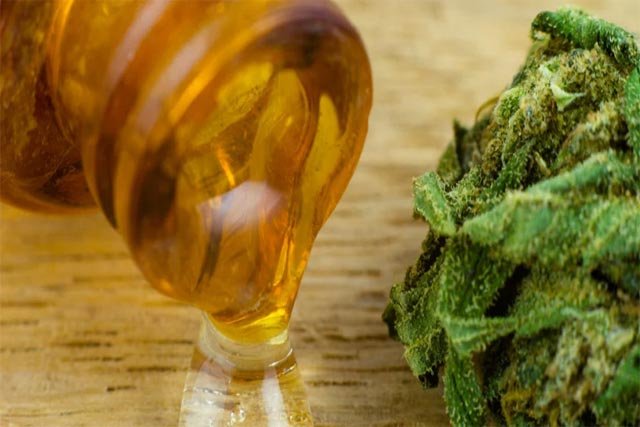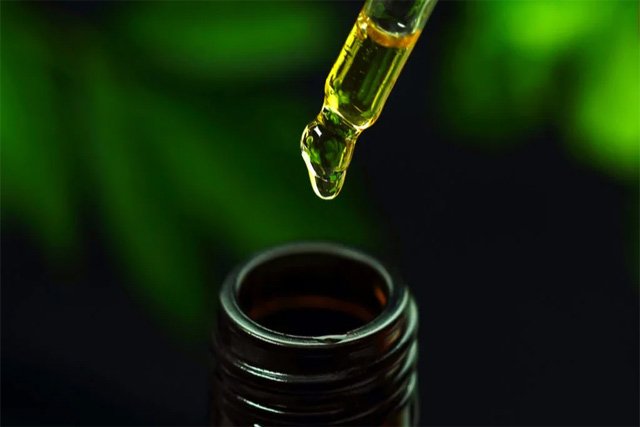The legal hemp industry has blossomed over the past few years, with many components of the plant offering unique benefits. Non-psychoactive cannabichromene oil is one such product garnering attention.
Studies suggest Cannabichromene oil has numerous therapeutic effects, from alleviating inflammation to improving neurological health. Taking cannabichromene tincture oils is safer than smoking hemp or vaping CBC-rich e-liquids. However, CBC oil has no approved medical uses in the United States.
In this guide, I’ll explore Cannabichromene oil and the different types of products on the market. I’ll also delve into the potential health benefits of CBC and discuss whether it’s better than cannabidiol (CBD).
What is CBC Oil?
Cannabichromene oil is a hemp-based tincture product containing high concentrations of a cannabinoid called cannabichromene (CBC). Hemp is a legal form of the Cannabis Sativa L. plant, from which more than 110 cannabinoids have been identified.
CBC is often referred to as a secondary cannabinoid, meaning hemp and marijuana plants produce small quantities of it. Scientists are still learning about how CBC interacts with the body, but it appears to work differently than THC and CBD.
Rather than making typical interactions with receptors in the endocannabinoid system (ECS), CBC acts on TRPA1 and TRPV1 receptors. In doing so, CBC ensures the body retains higher levels of natural endocannabinoids, such as anandamide and 2-AG.
Cannabichromene oil products contain hemp extract and a carrier oil – usually medium-chained triglyceride (MCT) oil. Mixing hemp extract with MCT oil makes the CBC more bioavailable, increasing the effectiveness of a dose and providing better value for money.
Is CBC Oil Legal?

Yes! Cannabichromene oil is legal throughout the United States – with one crucial caveat. CBC products must be derived from hemp and contain less than 0.3% delta-9-tetrahydrocannabinol (THC) on a dry weight basis.
The 2018 Agriculture Improvement Act (Farm Bill) has all the specifics on hemp. Essentially, the vital part is that the bill legalized all hemp plant components, including CBC. Hemp-derived products can consist of an unlimited amount of CBC.
Types of CBC Oil
Not all CBC oil is the same – and the type of extract used can significantly impact your product’s effects. Currently, there are three main types of CBC oil: pure CBC oil, CBD oil with CBC extract, and Delta-8 oil with CBC extract.
Pure CBC Oil

CBC oil made with isolated CBC extract is still fairly uncommon and relatively expensive. As hemp generally doesn’t produce much CBC, more plant material must be used to make the tincture, hence the higher price tag.
However, if you are looking for just the benefits of CBC, this product is ideal. CBC-isolate oil contains pure CBC extract with no other cannabinoids, terpenes, or flavonoids.
CBD Oil With CBC Extract

These oils are similar to regular hemp-derived CBD oils, except with a much higher CBC content.
Full-spectrum oils will have a small – but legal – amount of THC, whereas broad-spectrum tinctures do not contain any THC. Always opt for broad-spectrum oils if you are concerned about drug tests.
Normally, a CBD oil product will only have a few milligrams of CBC. But a tincture specifically mentioning CBC should contain 150mg or more.
Delta-8 Oil With CBC Extract

Unlike other forms of CBC oil, products made with delta-8 are psychoactive, will make you high, and could cause you to fail a drug test. However, delta-8 oil is legal in the majority of US states.
Delta-8 oil made with CBC initiates a high that is satisfying to both therapeutic and recreational users. Pairing the two cannabinoids makes for mellow and relaxing intoxicating effects.
However, unlike regular marijuana, delta-8 oil containing CBC extract is less likely to make you anxious or paranoid. If you want to get stoned but are extra sensitive to THC compounds, the balancing properties of CBC should help improve your experience.
7 Reasons to Take CBC Oil
Unsure whether CBC oil is right for you? Let’s take a deep dive into the potential benefits. Remember that all references to scientific studies are for informational purposes only – nothing in this article should be taken as medical advice.
It’s Non-Psychoactive
CBC oil (providing it doesn’t contain delta-8) is non-intoxicating and will make you high. There’s no way that CBC can get you stoned since it doesn’t bind with CB1 receptors in the endocannabinoid system.
The non-psychoactive nature of CBC eliminates the risk of any anxiety from taking it. While the lack of a high will put off recreational users, those seeking a therapeutic experience often consider the psychoactive properties of marijuana to be side effects.
For Neuroprotective Effects

With the federal government keeping cannabis in the most restricted Schedule 1 category of the Controlled Substances Act, it’s hard to believe it also has a patent on CBC and other cannabinoids as neuroprotectants. Even more so given that Schedule 1 substances are deemed to have “no medical use.”
But that’s the reality, and studies have indeed demonstrated that CBC has neuroprotective properties. A 2020 study published in the British Journal of Pharmacology described the neuroprotective effects of several cannabinoids, including CBC, cannabigerol (CBG), and tetrahydrocannabivarin (THCV).
The neuroprotective promise of CBC could ultimately lead to several therapeutic uses going forward. CBC is being explored as a treatment for Alzheimer’s disease as well as Huntington’s disease. CBC and other non-intoxicating cannabinoids could also have a role in treating the neurodegeneration caused by long-term chronic THC consumption.
Anti-Inflammatory Properties
Like many other cannabinoids, CBC has displayed anti-inflammatory potential in studies. There is hope that cannabinoids could eventually replace or work alongside traditional non-steroidal anti-inflammatory drugs (NSAIDs). Moreover, CBC appears to cause few side effects relative to NSAIDs.
While the anti-inflammatory effects of other cannabinoids are well-known, scientists are uncertain as to how CBC works. This is partly due to a lack of research but also because CBC doesn’t interact with the endocannabinoid system in a typical fashion.
CBC’s anti-inflammatory properties could perhaps be used in the future to treat arthritis, Crohn’s disease, and ulcerative colitis. However, much will depend on whether the impressive early findings in vivo and in animal trials are replicated in human studies.
Benefits for Acne

Acne troubles hundreds of millions of people worldwide. However, the frustrating skin disease that has knock-on effects on mental health has no cure, and many find the current treatments available to be ineffective. But CBC has shown promise as a remedy for acne.
Research indicates that CBC helps regulate the body’s production of sebum, a natural oil that moisturizes the skin, protects against UV ray damage from the sun, and more. Unfortunately, some people produce excessive levels of sebum, causing the pores of the skin to become blocked and trapped with dirt.
While many acne treatments – such as Roaccutane – dry out the skin, CBC does not inhibit sebum production. Instead, the regulatory effect helps the body produce healthy levels of sebum so that the skin is never too oily or too dry.
For Antidepressant Effects
Early research suggests that CBC may have potent antidepressant properties that are even more powerful than CBD’s. Fascinatingly, CBC alleviates depression in a remarkably simple manner – by increasing levels of anandamide, a compound naturally produced by the body.
Anandamide is an endocannabinoid, often referred to as the bliss molecule. A natural antidepressant with similarities to endorphins, anandamide helps us to feel good.
So far, few CBC-related studies have been carried out on humans. However, a 2010 study conducted on mice provided a good overview of CBC’s potential mood-boosting effects.
Relieves Pain

Cannabinoids are renowned for having analgesic properties – and CBC is no different. Studies show that while CBC isn’t as effective at reducing pain as other cannabinoids when taken in isolation, it works very well when taken as part of a whole-plant extract.
CBC may also have therapeutic value for fibromyalgia patients. Dr. Ethan Russo and other prominent researchers have theorized that fibromyalgia is caused by dysregulation in the endocannabinoid system.
Hence, CBC could ease fibromyalgia symptoms by regulating this system and boosting active concentrations of natural endocannabinoids. If this sounds too simplistic and too good to be true, bear in mind that the endocannabinoid system was only discovered in the 1990s. Scientists have lots of cannabinoid-related breakthroughs to make!
For Antibacterial Effects
The search for new classifications of antibiotics is underway, with cannabinoids an exciting candidate. CBC is one of several cannabinoids demonstrating impressive antibacterial effects in studies against nasty superbugs such as methicillin-resistant Staphylococcus aureus (MRSA).
Over the coming decades, humanity will become increasingly desperate as antibiotic resistance grows. But according to this 2008 paper published in the Journal of Natural Products, CBC could be a handy weapon in the fight against bacteria.
Cannabinoids appear effective against both gram-positive and gram-negative bacteria. This includes some particularly pesky strains that have scientists worried.
At present, much remains a mystery about how CBC and cannabinoids, in general, produce their antibacterial effects. This only emphasizes the need for more funding and studies in these critical areas of research.
How to Take CBC Oil

Perhaps my favorite aspect of Cannabichromene oil is its versatility. There are multiple ways to benefit from Cannabichromene oil, with each intake method having advantages. Let’s discuss.
Sublingual absorption: Applying CBC oil under the tongue delivers the cannabinoids into your bloodstream via sublingual absorption. This fast-acting method provides relief within minutes and is ideal if you need rapid relief from acute symptoms, such as neuropathic pain.
Taking CBC oil sublingually is efficient, convenient, and offers potent relief. Simply fill a full dropper, apply it under the tongue, and hold it for up to a minute before swallowing. If you need long-lasting relief, top up your dose every two to three hours.
In food and drink: You can also mix CBC oil into recipes and beverages. Doing this makes for an edible-like experience, with the benefits slower to hit but lasting for several hours longer. Adding CBC oil to food and drink is relatively discreet and convenient.
However, if you choose this method, ensure other powerfully flavored ingredients are present, or the earthy hemp extract may overwhelm your meal or beverage. Also, avoid exposing CBC oil to temperatures greater than 428°F, the boiling point of CBC.
On the skin: The topical application of CBC oil is a useful trick for certain situations. When you need inflammation or pain relief in a targeted area, rubbing CBC oil into the skin is often more effective than oral consumption. The same applies if using CBC as an acne remedy.
However, direct application of highly concentrated CBC oil is expensive. I find mixing CBC oil with another cream or salve a brilliant way of making my product go further.
Is CBC Better than CBD?
This question has no easy answer – it’s subjective and depends on your needs. Both CBC and CBD are non-intoxicating and share several therapeutic benefits. However, CBC may be a more potent antidepressant than CBD.
But CBD is also cheaper since it’s more abundant in hemp than CBC. Therefore, unless you are specifically looking for the effects of CBC, you may prefer a full-spectrum CBD product. As we learn more about CBC, it may become better for some health issues than CBD. Until then, the jury is out.




